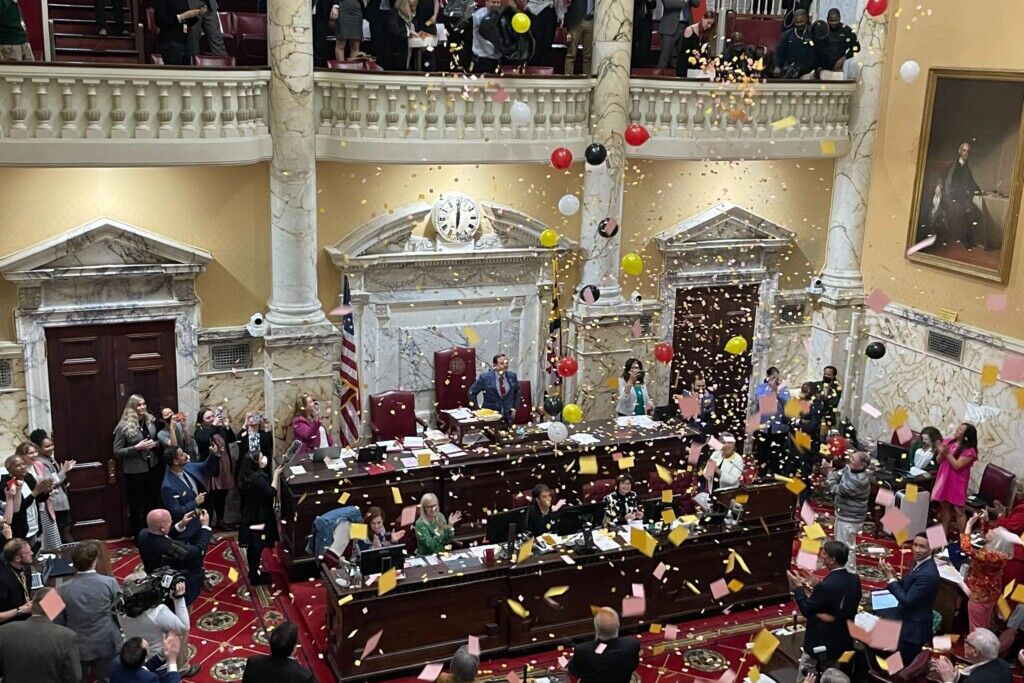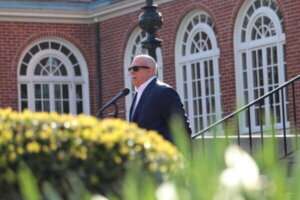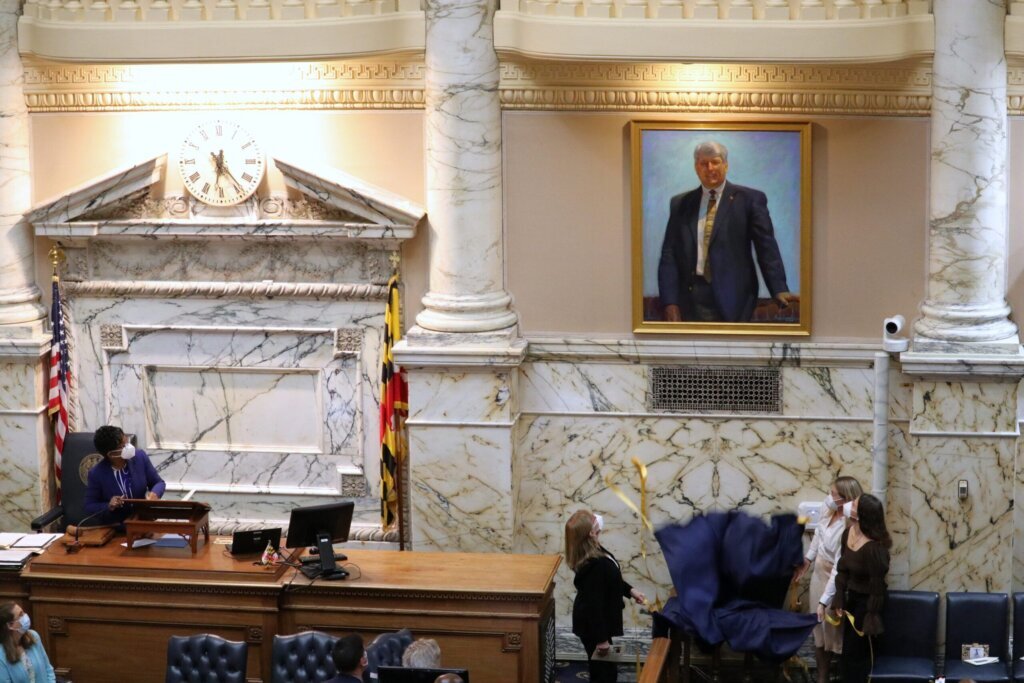
This article was republished with permission from WTOP’s news partners at Maryland Matters. Sign up for Maryland Matters’ free email subscription today.
This content was republished with permission from WTOP’s news partners at Maryland Matters. Sign up for Maryland Matters’ free email subscription today.
With most of this year’s heavy lifting behind them, Maryland lawmakers capped their 2022 session — their last day of legislating before facing voters in November — with a final sprint Monday that blended frenetic sausage-making with a festival atmosphere.
With sun-splashed receptions and a midnight confetti drop, it was the most normal Sine Die the State House complex has seen since 2018, as it was the first time this cycle that the close of a legislative session was not overtaken by the sudden death of a beloved presiding officer or the COVID-19 pandemic.
The state’s 188 lawmakers churned through hundreds of bills, left more than a few behind, and played the usual parliamentary games. They also took time to celebrate retiring colleagues — including many trailblazing committee chairs better known in Annapolis than in the outside world — for whom Monday represented the last spin of the legislative wheel.
Among the bills that received final passage on Monday were a compromise to increase local budgets for highway repairs, measures to enhance Maryland’s cybersecurity response efforts, and a bill — introduced but not passed for several years — that would raise the age that minors are legally allowed to marry to 17 with permission from their parents or guardians.
The George “Walter” Taylor Act, which would ban fire-fighting foam, food packaging, rugs and carpets that contain the chemical PFAS, also received final approval on Monday. Exposure to the chemical has been linked to certain cancers, reduced immune system function, developmental delays, decreased fertility and hypertension in pregnant women. The bill was named after a veteran firefighter who died of cancer after 31 years of service.
Earlier in the legislative session, lawmakers approved bills that accelerated the state’s greenhouse gas reduction goals, banned the sale and possession of untraceable “ghost” guns, cut taxes, established a statewide paid family and medical leave program for millions of workers, and expanded the state’s abortion rights laws in the face of restrictions elsewhere in the country.
Other bills met their demise in the final moments of the legislative session. Senators delayed debate on a bill that would have established “safe harbor” provisions in Maryland law to protect victims of child sex trafficking from prosecution. The measure failed to come back up for discussion and died.
A brief progressive uprising on the House floor late Monday night killed a bill that would have provided a raise to the next Frederick County sheriff.
Senate Bill 746, which was sponsored by Frederick County’s two senators, Ronald N. Young (D) and Michael J. Hough (R), would have boosted the sheriff’s salary from $125,000 to $140,000 in 2023 and 2024 and $150,000 in 2025. It passed the Senate 41-3 in mid-March.
But when the bill hit the House floor at about 11:20 Monday night, Del. Julian Ivey (D-Prince George’s) sought to “special order” it, seeking a delay on a final vote for an hour — after the session would have been over. House Speaker Adrienne A. Jones (D-Baltimore County) was incredulous.
“It’s a local bill,” she said — implying that it should be noncontroversial and that the concept of “local courtesy” should prevail.
Jones dismissed Ivey’s motion for a special order without a vote. But when it came time for a final vote on the legislation, Del. Wanika B. Fisher (D-Prince George’s), made the case against the bill by making the case against the long-serving sheriff, Chuck Jenkins (R) — though she didn’t mention him by name. Jenkins is a known hardliner when it comes to cracking down on undocumented immigrants.
“The sheriff’s office in Frederick County is making unconstitutional stops of Black and Brown Marylanders,” she said.

Del. Daniel L. Cox (R-Frederick) defended the legislation. “This is a bipartisan local bill,” he said.
And Del. Jesse T. Pippy (R-Frederick) noted: “It’s an election year. We don’t know who the next sheriff’s going to be.”
But Fisher started a prairie fire, and the bill failed on a 58-64 vote. Jones, moderate Democrats, a few institutionalists and Frederick County’s Democratic delegates joined with Republicans in voting in favor of the measure. Most progressive Democrats voted to kill it.
Efforts to include the vestiges of GOP Gov. Lawrence J. Hogan Jr.’s anti-crime package also fell short on the final day of session.
Debate on a Senate gun bill — which would create a center to track statewide gun crime data and was amended to include some Republican priorities — was pushed to the final 20 minutes of the chamber’s session.
It ultimately passed after the House stripped the measure of two provisions Republicans wanted: to classify theft of a firearm as a felony and to classify use of a handgun during a drug deal as a crime of violence subject to increased penalties.
The bill crossed over to the House of Delegates, where it passed at 11:57 p.m., the next-to-last bill to cross the finish line.
The last bill to pass was Senate Bill 763, which would require the Maryland State Commission on Criminal Sentencing Policy to collect and publish data related to cases prosecuted in state circuit courts. The bill is not as comprehensive as the “Judicial Transparency Act” proposed by Hogan multiple times during his tenure.
He told reporters on Monday that it’s “very frustrating” that lawmakers failed to pass his top anti-crime priorities.
He claimed that nearly 90% of Marylanders support his proposal to increase penalties for repeat violent offenders, while less than 10% oppose it. “The most important [element of our crime package] was tougher sentences for people that shoot people,” he said.
“It’s the most popular bill in the entire 2,000 bills in the legislature,” the governor added. “I don’t know how they’re going to explain that to the voters, but that’s for them to figure out.”
Even so, Hogan called this year’s legislative session “our best session yet after eight years.” He cited the legislature’s enactment of tax relief for some retirees, record funding for education, and the overturning of the General Assembly’s congressional map as accomplishments.

Busch portrait unveiled
The day was also filled with tributes to lawmakers of the past and present.
The House of Delegates paused Monday evening for the unveiling of the official portrait of the late Speaker Michael E. Busch (D-Anne Arundel), who led the chamber from 2003 until his death three years ago.
The portrait was painted from various Busch photos by Rick Casali, an Anne Arundel County artist who attended St. Mary’s High School, Busch’s alma mater.
In remarks before the unveiling, former House Majority Leader D. Bruce Poole (D-Washington) noted that he and Busch both joined the legislature in 1986. Poole was defeated in his bid for a fourth term. Busch was elected nine times.
“He had much better political instincts than I did,” Poole quipped.
The former legislator said the portrait captured Busch’s energy, approachability and sense of humor. Busch was remembered as a beloved leader who promoted women and people of color into senior posts and coached other lawmakers throughout their political journeys.
“Madame Speaker, I guarantee you Mike Busch is looking down and he’s very proud of you,” Poole said to Busch’s successor, Adrienne A. Jones (D-Baltimore County), the first Black and first female presiding officer in Maryland history.
Baltimore County Executive Johnny A. Olszewski (D), a former legislator, and Anne Arundel County Executive Steuart Pittman (D) attended the ceremony, as did several of Busch’s former top staffers. Two senators who served in the House — Guy J. Guzzone (D-Howard) and Craig J. Zucker (D-Montgomery) — watched from the gallery, as did former Delegates Heather R. Mizeur (D-Montgomery) and C. William Frick (D-Montgomery). Senate President Bill Ferguson (D-Baltimore City) also attended the ceremony.
Members of Busch’s family, including his wife Cindy and their daughters Erin and Megan, pulled away the blue drape that had covered the portrait all day. It hangs at the front of the chamber, over Jones’s left shoulder.
Saying goodbye in the Senate
All 188 legislative seats will be on the ballot this November. More than two dozen sitting lawmakers are retiring or leaving to run for other offices, and colleagues paused to mark their departures.
Two departing lawmakers, both Republicans, were feted in the Senate.
In his eight years in Annapolis, Sen. Robert G. Cassilly (R-Harford) has been known as the member who gets up on the Senate floor to ask questions or offer opinions more than any of his colleagues – and certainly more than any other Republican.
Several senators mentioned this during a tribute to Cassilly on the Senate floor Monday afternoon. He’s leaving the Senate at the end of the year to run for Harford County executive.
“The senator from the 34th [district] needs no introduction – we hear a lot from him,” Ferguson said. “And I mean that lovingly.”
Cassilly, who has also served on the Harford County Council and the Bel Air Town Commission, said his wife suggested he might want to run for state Senate as a tonic for serving in the Middle East in several capacities during the Iraq War from 2007 to 2010 and then working for the State Department through 2013.
“My wife said, ‘this would be good mental health therapy. Run for the Senate of Maryland,’” he recalled. “My wife is a great spouse. She’s not such a great expert on mental health therapy.”
But Cassilly and his colleagues, Democrats and Republicans, talked about their mutual respect, despite epic battles on the Senate floor and in the Judicial Proceedings Committee.
“We don’t carry [animus] off the floor,” Cassilly said. “It stops right here. We’re all people and that’s the way it should be.”
Flanked by his wife and kids, Hough, who is leaving to run for Frederick County executive after 16 legislative sessions, thanked current and former colleagues for their influence on his political career.
Hough also thanked former Maryland senator and U.S. Rep. Alexander X. Mooney (R-W.Va.), who inspired him to run for office when he was a legislative staffer. He has worked as Mooney’s chief of staff on Capitol Hill for the last five years, “and, quite frankly, the federal government would be much improved if they follow the model that we do here in the Maryland Senate,” he said.
“The Maryland Senate is really a great institution,” Hough said. “We come across the state from different areas, different backgrounds, different ideologies, but we sit together for 90 days, … and so many times we’re able to come together and work out solutions, and that’s what the American people want.”
The Senate’s ability to reach across the aisle was evidenced by parting words to Hough from Sen. Jill P. Carter (D-Baltimore City), who said he is “a great intellect” and the “person here that makes [her] laugh the most.”
“You make good times better; you make unbearable times more bearable,” Carter said. “And so often when it comes to fundamental issues — when it comes to fundamental rights and constitutional rights — we are more similar than we are different.”
Return of the party atmosphere
Early Monday afternoon, Todd Lamb, a lobbyist with the firm Capitol Strategies, LLC, was standing in front of the firm’s office on State Circle, piling racks of ribs into a large smoker.
“You think sitting in a hearing room, wearing a suit, trying to kill a bill is more glamorous than this?” he asked a passer-by. “This is what I aspire to be doing.”
He wasn’t joking. For the first time since the pre-pandemic opening day of the 2020 legislative session, the Annapolis party scene was in full force on Monday, with parties and receptions running from midday until deep into the evening.
State Circle and adjoining streets took on the air of Beale Street in New Orleans, with legislators, lobbyists, advocates, Hogan administration officials, staffers and political operatives wandering around flouting open container laws. The fact that it was a beautiful day, and that several parties had patios to entice revelers who might not want to risk COVID-19 by standing shoulder-to-shoulder in stuffy indoor situations, added to the festive atmosphere.
“It’s a real Sine Die!” several people were overheard saying, and it was hard to argue.
Outside the headquarters of the Maryland State AFL-CIO on School Street, Patrick Moran, president of AFSCME Council 3, was flagging down passers-by.
“You have to try the crab soup,” he said, gesturing toward the building entrance. “This is the greatest crab soup you’ll ever have.”
The soup definitely did not skimp on crab meat.
Political chatter was at def-con levels throughout the day, especially with lingering uncertainty about when the candidate filing deadline and primaries will be. And it reached an even higher level at a reception for Democratic gubernatorial candidate Wes Moore, in the plush upstairs bar at Harry Browne’s. There was, at times, a line outside the door to get in Harry Browne’s during the Moore reception. Only when the open bar closed did the crowd thin down.
Hogan said it was very exciting that Monday marked both the home opener for the Baltimore Orioles and the final day of the General Assembly session. “Our work continues for the next nine months after they leave town,” he said.
Lawmakers are expected to gather at the State House on Tuesday at noon for the first of the post-session bill signings.
Danielle E. Gaines, Bennett Leckrone and Elizabeth Shwe contributed to this report.







